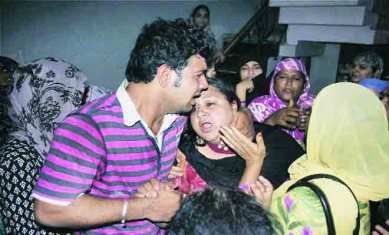Heartbreak Hospital
Khamoshi,a love story,was low on melodrama.

Khamoshi,a love story,was low on melodrama.
Every time you see her walking in the hospital corridor or interacting with her patients,you can sense that there is a scream trapped inside her. Her eyes speak about her inner turmoil but she doesnt let the words do the talking. She keeps it together because she is the selfless caregiver,the wonder nurse who heals crazy,heartbroken people even at the cost of her own heartbreak. She suffers,she endures,she loves,but all in silence. She is nurse Radha the protagonist of Asit Sens hauntingly beautiful Khamoshi.
monthly limit of free stories.
with an Express account.
Based on Ashutosh Mukherjees short story,Nurse Mitra which Sen first adapted in Bengali as Deep Jwele Jaai led by Suchitra Sen Khamoshi is a journey into a womans heart.
Nurse Radha falls in love with her patient Dev (Dharmendra),who goes back to his life and love when he recovers. History repeats itself when Radha is told to care for Arun (Rajesh Khanna),who is suffering from acute mania after being jilted by his girlfriend. Even though Radha initially resists taking up his case,she cant turn away from her call of duty. As she tends for Arun,she is reminded of Dev every step of the way. Radha is on the path of self-destruction because she suppresses her emotions,which ultimately leads to her breakdown. Its only towards the end that she confronts her fear in a letter and writes,Darti hoon,apni hi khamoshi mein ghut ke naa mar jaun.
Sen keeps the film low on melodrama,preferring minimalism instead. The emotional impact comes through Rehmans stellar acting,Gulzars wordplay and Kamal Boses brilliant cinematography. In a poignant scene,Arun tells Radha,Mujhe toh sirf shuruaat maaloom hai kahaani ki. Anth nahi. Radha replies,Anth mujhe maaloom hai,Arun babu. In another beautiful exchange with her colleague Beena,Radha ponders aloud about her predicament when she asks her,Pyaar kya hota hai? Kya kisi ko bhi pyaar karne se pyaar ho jaata hai?
Hemantda also the films producer recommended Rehmans name after having worked with her in Bees Saal Baad and Kohra. It was Rehman who suggested Khannas name after watching his Aakhri Khat. Sen and Hemantda were keen on Dev Anand. However,years later in an interview,Rehman confessed that perhaps Sanjeev Kumar would have been a better choice because Khanna wasnt mature enough to enact such a complex character. In the same interview,she also judged her own performance as nowhere close to Suchitra Sens in the Bengali version. The most interesting casting in Khamoshi is that of Dharmendra who just gets five minutes of screen time. He never faces the camera,and is mostly shown in flashes and shadows,reclining in the rocking chair as Tum pukar lo plays on. He is just a presence,almost surreal and unattainable.
Hemantdas hauntingly soulful tunes and Gulzars exquisite lyrics make up the soul and spine of Khamoshi. You can write pages on relationships and love,yet it wont convey what Gulzar does in just one tiny line mukhtasar si baat hai…tumse pyaar hai. And then,theres Woh shaam kuch ajeeb thi with Rajesh Khanna in that knitted polo neck sweater on a boat against the backdrop of Howrah Bridge. Even as Rehman is thinking of Dev,Khanna rests his head on her lap and croons,Main sochta tha mera naam gunguna rahi hai woh…naa jaane kyun laga ki muskura rahi hai woh. Khanna was hesitant about the romantic gestures in the song because Rehman was his senior and it took some effort on Sens part to make the co-actors comfortable.
And then,of course,there is the pièce de résistance Humne dekhi hai un aankhon ki mehakti khushboo. Can you imagine this song in anybody elses voice other than that of Lata Mangeshkar? I cant. But would you believe it that Gulzarsaab actually wanted Hemantda to sing this song? In the book In the Company of a Poet,Gulzar tells author Nasreen Munni Kabir,I wanted Hemantda to record this song in his voice but he wanted Lataji to sing the song. I was a bit reluctant. Not about Lataji singing but because the lyrics were from the point of view of a man who is describing a womans eyes,so I felt a male singer should sing it…I explained this to Hemantda but he insisted that no one could sing it like her…Lataji has such talent that she can change the gender of a song, he says. The song,now a classic,attracted a lot of criticism for its abstract poetry Gulzar addresses this in the book when he says,The song did not fit into the traditional idea of poetry because of its new imagery. The criticism levelled at me by poets and others was the very premise of the words. A song talking about the fragrance of the eyes? How can eyes have fragrance? How can you call that poetry? That was essentially what I heard.
For all the critics and non-believers: sirf ehsaas hai yeh,rooh se mehsoos karo. This sums up the film too.